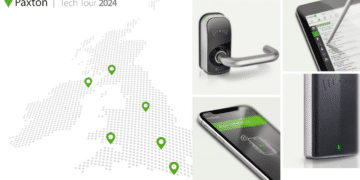Morphean’s VP of Sales and Marketing, Martyn Ryder, considers the importance of ethics and trusted partnerships when securing high streets across Europe.
The removal of Covid-related restrictions and re-opening of businesses across the UK and Europe can only be good news for the retail industry. Following an extended period of such uncertainty and the financial downturn that the pandemic restrictions caused, as Christmas approaches retailers will be very eager to make up for lost time. Preparations to drive footfall include considerations about look and feel, and product inventory and placement, while keeping customer concerns top of mind. Security has also been high on the agenda, with retailers readying their stores to guard against theft and organised crime which was up 8.7% in 2019 to £4.8bn in UK[1], and cost €21.3 across Europe[2].
But behind the alluring shop fronts sit the systems and processes that make today’s multi-faceted and omni-channel retail strategies possible. They comprise technologies and cloud-enabled infrastructures that are capable of supporting modern customer demand and an ever more frictionless shopping experience. As retailers direct their attention to post-pandemic rehabilitation, it is these systems and the many layers of complex customer data that they contain that are increasingly the target of malicious endeavour operated by cyber gangs seeking profits through ransomware attacks or selling the proceeds on the dark web[3]. Making the right choices about partners and technology will be key.
Thorough product evaluation at the core of tech selection
Modern physical security solutions, video surveillance as-a-service (VSaaS) and access control as-a-service (ACaaS), are the natural successors to the standalone analogue systems of the past. Where analogue CCTV and manually operated barriers were extremely limited in their capabilities, today’s cloud-enabled solutions are capable of unlocking powerful insights from the data they collect, to help improve high street security and streamline operations.
But connecting physical security technologies such as surveillance cameras to an IT network is not without risk, so it’s imperative to consider the cybersecurity of the devices themselves. Unsecured systems which are not manufactured in accordance with cybersecurity principles can be easily used as a backdoor to gain access to a wealth of customer information; for example, using a vulnerability in a security camera or sensor to attack a supermarket’s customer database.
A lack of knowledge around the providers of such solutions and the manufacturing processes they employ has led in some cases to questions being asked of the technologies that have been selected and the ethics of the companies that produce them. When it comes to modern cloud-enabled security solutions, retailers who have not thoroughly checked the vendor credentials cannot be wholly confident that their valuable surveillance data is secure. This places their business at risk, where data breaches, cyber attacks and even terrorist activity can have a devastating impact. The average cost of a data breach to the retail industry is just under $2 million (£1.55 million)[4]. When downtime is factored in, plus the long-term damage to brand and reputation, it can have a devastating impact.
Forging trusted partnerships based on ethical principles
When it comes to modern retail and the use of data in the cloud, retailers should be looking carefully at who they choose to associate their brand and do business with. Partnering with a trustworthy provider that has a track record of success as well as adhering to ethical practices and codes of conduct that are common across the EU will provide assurances of corporate governance and closer scrutiny of manufacturing processes.
In a world where products are often hastily produced in countries with low levels of quality assurance and with poor transparency of labour laws, it is all too easy to seek out and use devices that have been manufactured cheaply and brought to market quickly. But short-term gain often portends a longer-term cost. While speed of deployment to ensure comprehensive protection can be a key factor in partner selection, this should be balanced with a thorough process of due diligence to determine the integrity of vendor, technology, and increasingly the supply chain.
A confident future means asking the right questions now
As retail businesses consider the evolving threat landscape and the broad range of challenges that the future will bring, cloud-enabled physical security is earning its place in the retailer’s armoury. But with a retailer’s ability to operate relying heavily on the connectivity of the technologies they have deployed, any disruption to operations can prove costly. It’s therefore essential that retailers ask the right questions of their providers to guarantee that ethics and integrity, together with trustworthy manufacturing practices, are employed when developing security solutions they will come to rely on.
High quality, data driven, network security systems provide benefits across many aspects of retail operations. Not only do they give decision makers a comprehensive view of the retail operation, but they also represent an important strategic enhancement to support the business over the longer term. Working with a trusted partner will enable retail managers and their security teams to get the most out of VSaaS and ACaaS, and to enable them to respond with confidence to the threats and challenges of today and also tomorrow.

[1] https://www.retailresearch.org/crime-costs-uk.html
[2] https://www.retailresearch.org/crime-comparisons.html
[3] https://www.csoonline.com/article/3249765/what-is-the-dark-web-how-to-access-it-and-what-youll-find.html
[4] https://www.pikselgroup.com/blog/monster-security-breaches-retail-avoid





